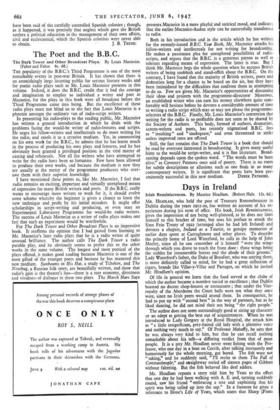The Poet and the B.B.C.
The Dark Tower and Other Broadcast Plays. By Louis Macneice. (Faber and Faber. 8s. 6d.) THE popularity of the B.B.C.'s Third Programme is one of the most remarkable events in post-war Britain. It has shown that there is
an astonishingly large listening public for serious literary works and for poetic radio plays such as Mr. Louis Macneice presents in this volume. Indeed, it does the B.B.C. credit that it had the courage
and imagination to employ so individual a writer and poet as Macneice, for the plays in this book were all broadcast before the Third Programme came into being. But the excellence of these radio plays must not blind us to the fact that Louis Macneice is a phoenix amongst the ordinary run of radio-script writers.
In presenting his radio-plays to the reading public, Mr. Macneice has written a general introduction in which he deals with the problems facing the would-be writer of radio-features and scripts. He urges his fellow-writers and intellectuals to do more writing for the radio, and extols it as a creative medium. Yet, in commenting on his own work for the B.B.C., he admits that he has learnt much' in the process of producing his own plays and features, and he has obviously been granted a privileged position in the vital matter of casting and rehearsals. Not all the writers who have attempted to write for the radio have been so fortunate. Few have been allowed to produce their own works, and because the medium is new they are usually at the mercy of the programme producers who over- awe them with their superior knowledge.
I have mentioned these points as, like Mr. Macneice, I feel that radio remains an exciting, important and virtually unexplored means of expression for many British writers and poets. If the B.B.C. really wants to encourage more writers to work for it, it should evolve some scheme whereby the beginner is given a chance to learn the new technique and profit by his initial mistakes. It might offer scholarships in script-writing and producing, or even start an Experimental Laboratory Programme for would-be radio writers. The success of Louis Macneice as a writer of radio plays makes one feel that such an experiment would be worthwhile.
For The Dark Tower and Other Broadcast Plays is an impressive book. It reaffirms the opinion that I had gained from listening to Mr. Macneice's later radio plays that he is a radio writer of quite unusual brilliance. The author calls The Dark Tower a radio parable play, and he obviously seems to prefer this to the other works in the same volume. The longest and most poetical of the plays offered, it makes good reading because Macneice is one of the most gifted of the younger poets and because he has mastered this new medium. Sunbeams in His Hat, a study of Tchekov, and The Nosebag, a Russian folk story, are beautifully written, and show that radio's gain is the theatre's loss—there is a rare economy, directness and vividness of dialogue in these two plays. The March Hare Saga
presents Macneice in a more. playful and satirical mood, and indicates that the earlier Macneice-Auden style can be successfully transferred to radio.
Both in his introduction and in the article which he has written for the recently-issued B.B.C. Year Book, Mr. Macneice attacks his fellow-writers and intellectuals for not writing for broadcasting. He makes a passionate plea for unexplored possibilities of radio- scripts, and argues that the B.B.C. is a generous patron as well as tolerant regarding means of expression. The latter is true. But I think Mr. Macneice begs the whole question when he accuses British writers of being snobbish and stand-offish about the B.B.C. On the contrary, I have found that the majority of British writers, poets and dramatists long for a chance to be heard on the air, but they have been intimidated by the difficulties that confront them in attempting to do so. Few are given Mr. Macneice's opportunities of discussing their ideas and projects with the programme-directom Moreover, an established writer who can earn his money elsewhere quite com- fortably will hesitate before he devotes a considerable amount of time to writing a radio script which may or may not please the programme- selectors of the B.B.C. Finally, Mr. Louis Macneice's contention that writing for the radio is so profitable does not seem to be shared by the Society of Authors. This body, formed of authors, dramatists, screen-writers and poets, has recently stigmatised B.B.C. fees as "insulting" and "inadequate," and even threatened to strike unless improved rates are offered 'Still, the fact remains that The Dark Tower is a book that should be read by everyone interested in broadcasting. It gives many useful hints to the would-be script-writer, and it is fine literature. Broad- casting depends upon the spoken word. "The words must be born alive," as Coventry Patmore once said of poetry. There is no room for subtle descriptions or allusions such as one finds in so many contemporary writers. It is significant that poets have been pre-
eminently successful in this new medium. DEREK PATMORE.


































 Previous page
Previous page